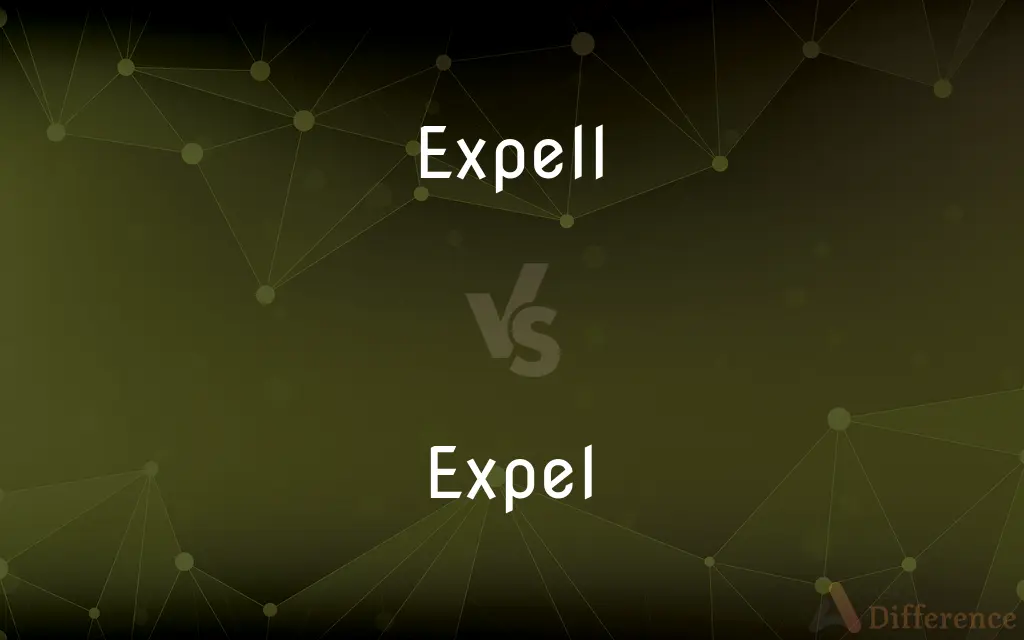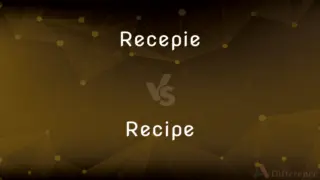Expell vs. Expel — Which is Correct Spelling?
Edited by Tayyaba Rehman — By Fiza Rafique — Updated on March 29, 2024
"Expell" is a misspelling. The correct spelling is "Expel," which means to force out or eject from a place or situation.

Table of Contents
Which is correct: Expell or Expel
How to spell Expel?

Expell
Incorrect Spelling

Expel
Correct Spelling
ADVERTISEMENT
Key Differences
Use a mnemonic: "EXPEL the extra L."
Remember "Expel" is like "repel," both having one 'l'.
Think of the process: you EXPEL once, so one 'l'.
Visualize pushing out one thing, hence one 'l' for one action.
Associate "expel" with "expulsion," both having single 'l'.
ADVERTISEMENT
How Do You Spell Expel Correctly?
Incorrect: They threatened to expell anyone who broke the rules.
Correct: They threatened to expel anyone who broke the rules.
Incorrect: She was afraid they would expell her from the program.
Correct: She was afraid they would expel her from the program.
Incorrect: The school decided to expell him for cheating.
Correct: The school decided to expel him for cheating.
Incorrect: Can a club expell its members for not paying dues?
Correct: Can a club expel its members for not paying dues?
Expel Definitions
Expel can indicate the process of officially making someone leave an organization or group.
The club expelled members who broke the rules.
Expel can indicate the act of ejecting something with force.
The volcano expelled lava and ash.
Expel means to drive or force out.
He was expelled from school due to misconduct.
In the context of feelings, expel means to get rid of.
She meditates to expel negative thoughts.
Expel also means to discharge from a body.
Plants expel oxygen during photosynthesis.
To force or drive out
Expel an invader.
To discharge from or as if from a receptacle
Expelled a sigh of relief.
To deprive of membership or rights in an organization; force to leave
Expelled the student from college for cheating.
To eject or erupt.
(obsolete) To fire (a bullet, arrow etc.).
(transitive) To remove from membership.
He was expelled from school multiple times.
(transitive) To deport.
To drive or force out from that within which anything is contained, inclosed, or situated; to eject; as, to expel air from a bellows.
Did not ye . . . expel me out of my father's house?
To drive away from one's country; to banish.
Forewasted all their land, and them expelled.
He shall expel them from before you . . . and ye shall possess their land.
To cut off from further connection with an institution of learning, a society, and the like; as, to expel a student or member.
To keep out, off, or away; to exclude.
To discharge; to shoot.
Then he another and another [shaft] did expel.
Force to leave or move out;
He was expelled from his native country
Put out or expel from a place;
The child was expelled from the classroom
Remove from a position or office;
The chairman was ousted after he misappropriated funds
Cause to flee;
Rout out the fighters from their caves
Eliminate (substances) from the body
Expel Meaning in a Sentence
To expel a member from the council requires a majority vote.
The university may expel students who engage in plagiarism.
The senate can expel a senator for misconduct with a two-thirds vote.
The organization has the right to expel any member who violates its principles.
Many schools have a zero-tolerance policy and will expel students for violence.
Schools sometimes expel students for bullying behavior.
To expel a disruptive fan from the stadium, security is called.
Some countries expel diplomats as a political sanction.
To expel the foreign substance, the body's immune response kicked in.
Common Curiosities
What is the root word of Expel?
The root word is the Latin "expellere."
What is the pronunciation of Expel?
It's pronounced as /ɪkˈspɛl/.
Why is it called Expel?
It's derived from the Latin word "expellere," meaning "to drive out."
Which preposition is used with Expel?
"From" as in "expelled from school."
Which conjunction is used with Expel?
Standard conjunctions like "and" or "or" can be used.
Is Expel an abstract noun?
No.
What is the verb form of Expel?
The verb form is "expel."
Which vowel is used before Expel?
"An" is used before words that sound like they start with a vowel sound, but typically "a" is used before "expel."
What is the singular form of Expel?
Expel.
Is Expel an adverb?
No.
Is the word Expel is imperative?
It can be used in the imperative mood, e.g., "Expel him now!"
What is the plural form of Expel?
Expels, in contexts referring to multiple instances of expelling.
Is Expel a vowel or consonant?
"Expel" is a word containing both vowels and consonants.
How many syllables are in Expel?
Two syllables.
How do we divide Expel into syllables?
Ex-pel.
What is a stressed syllable in Expel?
The second syllable, "pel."
What part of speech is Expel?
Verb.
What is another term for Expel?
Eject, oust, remove.
What is the first form of Expel?
Expel.
Is Expel a negative or positive word?
Generally neutral, but contextually it's often negative as it denotes removal or ejection.
Is Expel a collective noun?
No.
Is the Expel term a metaphor?
It can be used metaphorically, e.g., "expel negative thoughts."
Is the word “Expel” a Direct object or an Indirect object?
It's a verb, so it can have a direct object, e.g., "Expel the intruder."
How is Expel used in a sentence?
"The school board decided to expel the student due to his repeated violations of the code of conduct."
Which article is used with Expel?
"A" or "the" depending on the context.
Is Expel a noun or adjective?
"Expel" is a verb.
What is the opposite of Expel?
Admit, welcome.
Which determiner is used with Expel?
Determiners like "this," "that," "each," can be used, depending on context.
Is Expel a countable noun?
"Expel" is not a noun; it's a verb.
Is the word Expel is Gerund?
"Expelling" would be the gerund form.
What is the second form of Expel?
Expelled.
What is the third form of Expel?
Expelled.
Share Your Discovery

Previous Comparison
Remaning vs. Remaining
Next Comparison
Recepie vs. RecipeAuthor Spotlight
Written by
Fiza RafiqueFiza Rafique is a skilled content writer at AskDifference.com, where she meticulously refines and enhances written pieces. Drawing from her vast editorial expertise, Fiza ensures clarity, accuracy, and precision in every article. Passionate about language, she continually seeks to elevate the quality of content for readers worldwide.
Edited by
Tayyaba RehmanTayyaba Rehman is a distinguished writer, currently serving as a primary contributor to askdifference.com. As a researcher in semantics and etymology, Tayyaba's passion for the complexity of languages and their distinctions has found a perfect home on the platform. Tayyaba delves into the intricacies of language, distinguishing between commonly confused words and phrases, thereby providing clarity for readers worldwide.


































